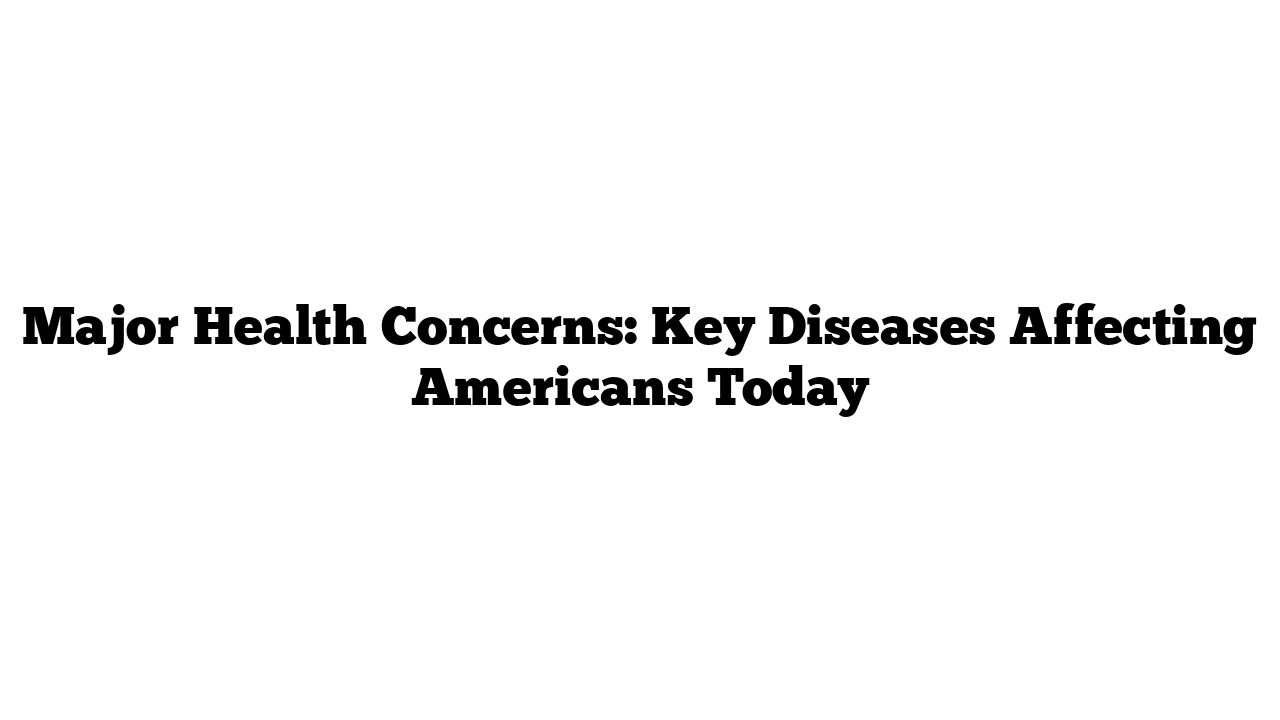Major Health Concerns: Key Diseases Affecting Americans Today
Numerous diseases affect humans. Many people experience common illnesses, like seasonal allergies or stomach bugs. Chronic diseases, such as heart disease and diabetes, impact millions.
While some conditions are common, others are rare. Some are serious, like cancers, which have high morbidity and mortality rates. History shows that the U.S. and the world have faced many epidemics, including the HIV pandemic in the 1980s and the COVID-19 pandemic starting in 2019.
Overview of Common Diseases
This guide highlights common diseases in the United States. Some conditions show symptoms, while others remain silent. Most are diagnosable and treatable, but prevention is crucial.
1. Heart Disease
Heart disease is the leading cause of death in the U.S., affecting all ethnic groups and genders. According to the Centers for Disease Control and Prevention (CDC):
- One person dies every 34 seconds from heart disease.
- More than 800,000 heart attacks occur annually (one every 40 seconds).
- Heart disease accounts for 1 in 5 deaths, claiming nearly 700,000 lives each year.
2. Cancer
As of 2019, about 17 million Americans had a history of invasive cancer. Each year:
- Approximately 1.9 million new cancer cases are diagnosed (excluding some skin cancers).
- 600,000 Americans die from cancer annually (over 1,600 deaths daily). Cancer ranks second as the most common cause of death in the U.S.
3. Chronic Respiratory Diseases
Around 5% of American adults have chronic lower respiratory diseases, including asthma and COPD. These diseases lead to:
- 870,000 emergency room visits each year.
- 152,000 deaths annually. They are the sixth leading cause of death in the U.S.
4. Obesity
The U.S. is facing an obesity epidemic:
- Over 42% of Americans are classified as obese.
- About 9% have severe obesity. Lifestyle changes, including a healthy diet and exercise, are essential for treatment. Obesity is linked to various health complications.
5. Alzheimer’s Disease
Approximately 6.5 million Americans live with Alzheimer’s disease:
- 1 in 9 Americans over 65 has this condition.
- Most patients are 75 or older, with a higher prevalence in women. Experts estimate the number of Alzheimer’s patients may exceed 12.5 million by 2050.
6. Diabetes
Diabetes affects over 37 million Americans (more than 11% of the population). Key points include:
- Many individuals show no symptoms until the disease is advanced.
- 1 in 4 people with diabetes are undiagnosed.
- 96 million adults have prediabetes.
7. Substance Abuse
Substance abuse impacts individuals across all demographics:
- 13% of Americans aged 12 and older reported illicit drug use recently.
- Over 25% of adults engage in heavy alcohol use.
- Nearly 92,000 drug overdose deaths occur annually, with 20% linked to opioids.
8. Infectious Diseases
Infectious diseases remain a public health concern. Common bacterial and viral infections include:
- Influenza: Affects 38 to 45 million Americans annually.
- Chlamydia: The most reported sexually transmitted infection with 1.5 million cases in 2020.
- Staphylococcus: Causes approximately 119,000 bloodstream infections yearly, leading to 20,000 deaths.
- Escherichia coli (E. coli): Responsible for 265,000 illnesses and about 100 deaths annually.
- Herpes Simplex Virus (HSV): Causes cold sores and genital herpes. 575,000 new genital herpes infections occur yearly.
9. Chronic Kidney Disease (CKD)
Around 15% of adults (37 million people) have CKD:
- Up to 90% are unaware they have it.
- 40% of those with severe CKD do not know their condition.
10. Mental Illness
Mental health is a significant concern:
- More than 50% of Americans will face a mental disorder in their lifetime.
- 1 in 5 Americans experiences mental illness annually.
- 1 in 25 Americans lives with serious mental illnesses like bipolar disorder or schizophrenia.
Conclusion
These diseases are common in the U.S. Most are treatable and covered by health insurance. Seeking timely diagnosis and treatment can reduce the risk of complications.
Ongoing research aims to find effective treatments and cures for these diseases. Future advancements may lead to fewer cases and improved healthcare access.
References:
- https://www.cdc.gov/heartdisease/facts.htm#
- https://www.cancer.org/content/dam/cancer-org/research/cancer-facts-and-statistics/annual-cancer-facts-and-figures/2021/cancer-facts-and-figures-2021.pdf
- https://www.cdc.gov/nchs/fastats/copd.htm
- https://www.niddk.nih.gov/health-information/health-statistics/overweight-obesity#
- https://www.alz.org/alzheimers-dementia/facts-figures#
- https://www.cdc.gov/nchs/fastats/drug-use-illicit.htm
- https://www.cdc.gov/nchs/fastats/drug-overdoses.htm
- https://www.cdc.gov/flu/about/burden/past-seasons.html
- https://epi.dph.ncdhhs.gov/cd/diseases/ecoli.html
- https://www.cdc.gov/std/herpes/stdfact-herpes-detailed.htm#:
- https://www.hopkinsmedicine.org/health/conditions-and-diseases/herpes-hsv1-and-hsv2/oral-herpes
- https://www.cdc.gov/kidneydisease/publications-resources/ckd-national-facts.html#
- https://www.cdc.gov/mentalhealth/learn/index.htm#
